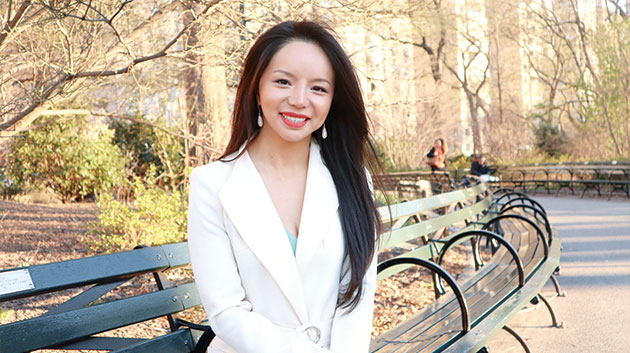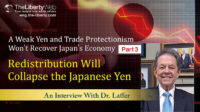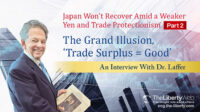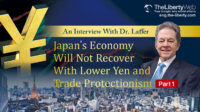My Hope Is to Revive True Chinese Spirit
An Interview With Anastasia Lin
Canadian beauty queen and actress, Anastasia Lin, is known as a prominent human rights activist. She emigrated from China to Canada when she was 13 years old. In 2015, she was refused entrance to China as persona non-grata, when she was to participate in a Miss World pageant to be held in China. This incident was covered by the media around the world. She has been fighting for freedom against the communist regime in China in recent years.
Anastasia Lin:
Actress and human rights activist.
Miss World Canada 2015, Leo Award for Best Actress 2016.
Born in 1990 in Hunan, China and graduated the University of Toronto.
Interviewer:
Motohisa Fujii
Director General of International Politics Division, Happy Science
As a Prominent Human Rights Activist
Fujii: First of all, what motivated your activities?
Lin: It all started when my father was threatened by Chinese communists, which prompted me to do more to try to raise the issue of human rights of China. After a while I realized how important it actually is. Because more and more victims came to me and they told me their stories. They have never really had their stories heard before. If no one speaks up, it will just continue forever and it doesn’t get better. Things don’t just get better on their own. So, I felt that was the only choice I had.
Fujii: Could you tell me about your experiences regarding your family in China?
Lin: I felt that no matter where I am, as long as my family is in China, I can’t feel completely free. They continue to harass my grandparents and my father. The police go through their home routinely. I need to keep myself under the spotlight so that I’ll have a voice. If something happens to my family, I have the power to speak up for them. Otherwise I’ll just be blending into obscurity and then no one will hear me. My family would have no one to speak up for them. That is one of the reasons. Also, I realized how important freedom is to me and it should be preserved. I think people in the free world even now don’t realize how important freedom is.
What I Learned in China Was not True
Fujii: After you immigrated to Canada, what did you feel in another world?
Lin: The difference really came when my mother introduced me to a lot of newspapers and talked about things that I couldn’t hear about in China. And I started to do more reading by browsing the internet. The more I did, I got more interested in and came to understand that what I learned in China was mostly not true. Like the dots are connected in line, I realized that there was the world that I could explore. From that point, I was very skeptical of the words written by any party or any government, and started to research on my own. I got out and talked to Falun Gong practitioners, Tibetans and Uyghur people. I joined their parades and saw how they practiced their activism, collected partisans and also had MPs speak up for them. That’s when I was first exposed to the western idea of democracy.
Fujii: What made up your mind to be an actress?
Lin: When I first started performing as an actress, I was 18 years old and a theater school student. One day a Chinese producer approached me and talked about a film. There were some very sensitive topics that the Chinese government wouldn’t like. A majority of the Chinese actresses didn’t want to participate in the production. Because when they would go back to China, they wouldn’t get a visa. And their families might be threatened – just like mine – so they could not find actresses for the film. I jumped on the opportunity. That’s how I started. Through this film making, I interviewed the victims and heard about all their stories. That’s what really prompted me to have human rights activities as the platform for the Miss World pageant.
The Cultural Revolution Comes to North America
Fujii: What are you worrying about freedom of speech now?
Lin: Canada, Australia, the U.S. and other countries are having severe Chinese infiltration in their culture. Not only newspapers but movies are now been censored. Even in Hollywood, they have to change their scripts so that they can get into China. And in the universities’ campuses, you cannot even talk about Taiwan, Hong Kong and those kinds of sensitive issues. Because they have a lot of Chinese students who are funded by China. Recently a UK university has taken out Taiwan as an independent country on the map, because Chinese students backlashed. These are immediate threats to our freedom of speech here in the west. If the students don’t learn human rights issues in the university, they are not aware of them. They cannot even fight against it in the west and no one will speak up for the suppressed people in China.
Fujii: On April 7, the Wall Street Journal posted your opinion article titled “The Cultural Revolution Comes to North America”
Lin: At the beginning of the Chinese Cultural Revolution, people just continued to be silent and censor themselves. It doesn’t get better if people don’t speak up. It will only get worse. So that’s what compelled me to write the article. We have the freedom here for now. But it needs to be preserved instead of being taken for granted.
Spiritual Vacuum in Chinese People’s Mind
Fujii: What do you think of the recent situation in China?
Lin: What I worry more about nowadays is the social credit system. Regular Chinese people are being suppressed. If they say something wrong, their social credit is so decreased, that they cannot even book airline tickets. They only know how to obey. That’s very dangerous for China’s future.
Fujii: You are also known as a Falun Gong practitioner.
Lin: Chinese authentic religions are Taoism, Buddhism and Confucianism. Because of the Cultural Revolution, all the traditional beliefs were underground and the people had to abandon some traditional beliefs. So, there is the spiritual vacuum in Chinese people’s minds. For a lot of Chinese, when they saw Falun Gong, they saw the traditional beliefs that they once had. That’s why until 1999 there are 70 to 100 million people, one-tenth of Chinese population, who practice it.
Tiananmen Massacre Broke Chinese People’s Heart
Fujii: This year is the 30th anniversary of the Tiananmen Square Incident in 1989.
Lin: The Tiananmen massacre was something that I had never heard of in China, because it was never taught. It was not even whispered. People don’t talk about it, so the young generations like me wouldn’t have ever known. I only learned about it by watching a video when I came to Canada and I thought at that time that the Chinese people were still very hopeful for reforms. But the killing of the Chinese students and the subsequent crackdown on a lot of the Chinese people really broke their heart and hope.
After the Tiananmen massacre, I think the Chinese people became very materialistic. Their philosophy and spirit were broken, and the hopelessness was there. People started to money-worship, without any moral concerns for others. They lost their compassion. It’s really sad. In the Tiananmen massacre video, there are brave Chinese students who stood up to the Communist Party. I was moved by their spirits and felt very proud of them. They truly think about others. I hope to see that kind of spirit in China again. Let’s hope that things will get better and they’ll keep up the fight.
Fujii: On March 3, Happy Science founder & CEO Ryuho Okawa spoke in Taipei that “a kind of ‘Free China Party’ should be established in China, because people in China need at least a two-party system”(Taiwan Must Spread Freedom, Democracy and Faith Into Mainland China)
Lin: It should be Chinese people living there that decide their own future. And the idea of having opposition to the Communist party is a bit naive because a totalitarian state has been in existence there for the past 70 years. I think the most fundamental change for the Chinese people is to firstly separate communism from China. The Communist Party doesn’t represent China. Our culture has a history of five thousand years and greater roots than the atheist government does. Chinese people will be able to find their roots again and speak for themselves. That’s my hope.
Treasure Your Freedom in the Free World
Fujii: Would you give us your message to the Japanese people?
Lin: I think people who are living in the free world don’t know how it is to feel under an authoritarian regime. Unfortunately, the Chinese people have lived under communism for many years. The Japanese are very lucky to have their culture preserved, unlike the Chinese people. Their culture was just destroyed. So, one of the things I want to say is, treasure your freedom as you have treasured your culture. It’s the jewel of the people in the world. When one wants to open one’s eyes and see what’s going on in your neighboring country, it’s frightening. But I should say stay true to who you are, as Japanese, your country and your values.



















